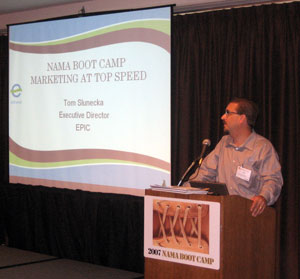 “Marketing at Top Speed” was the title of the presentation made to agrimarketing professionals this week in Kansas City by the executive director of the Ethanol Promotion and Information Council (EPIC), Tom Slunecka.
“Marketing at Top Speed” was the title of the presentation made to agrimarketing professionals this week in Kansas City by the executive director of the Ethanol Promotion and Information Council (EPIC), Tom Slunecka.
Slunecka told the members of the National Agri-Marketing Association (NAMA) that ethanol has brought a major paradigm shift to agriculture that stands to benefit every segment of the industry, including the livestock sector, in the long term. He urged them all to become “ethanol evangelists” and promote the good news about the fuel to fight those who are trying to undermine it.
EPIC certainly has a great story to tell, growing an organization to promote ethanol in less than three years into what is a major success story. Just this year alone, Slunecka says they have generated over 700 million media impressions for ethanol – mostly due to their high profile with the Indy Racing League and other motor sports venues. Ethanol may seem to be generating a great deal of negative publicity, but as the saying goes “there’s no such thing as bad publicity.” And there is no denying that ethanol has brought new life to rural America.


 There’s a great
There’s a great  Grocery giant Safeway is converting its entire fleet of trucks in Arizona to 20% biodiesel.
Grocery giant Safeway is converting its entire fleet of trucks in Arizona to 20% biodiesel. The University of Florida has selected
The University of Florida has selected  The U.S. subsidiary of Canada’s
The U.S. subsidiary of Canada’s  The second annual
The second annual 
 “Louis Dreyfus is helping to meet what we hope will be America’s continued growing demand for renewable, cleaner-burning biodiesel,” said Larry Schafer, NBB political senior advisor. Schafer attended the grand opening event today. “It is adding valuable refining capacity to our nation’s fuel supply and replacing foreign oil with environmentally friendly, domestically produced fuels.”
“Louis Dreyfus is helping to meet what we hope will be America’s continued growing demand for renewable, cleaner-burning biodiesel,” said Larry Schafer, NBB political senior advisor. Schafer attended the grand opening event today. “It is adding valuable refining capacity to our nation’s fuel supply and replacing foreign oil with environmentally friendly, domestically produced fuels.”